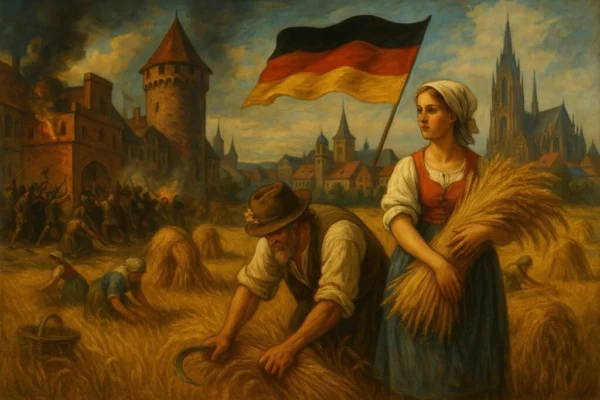What happened on August 24? Germany and world history

Some dates are not just points in the calendar – they are milestones that have etched themselves into the collective memory of societies. August 24 is one of those days. In Germany, it oscillates between rural rituals tied to Bartholomew’s Day, religious traditions, uprisings such as the Fettmilch revolt in Frankfurt, and political upheavals stretching into the 20th century. Each episode reflects the turbulence and resilience of German history. As G.Business reports, this date has long served as a mirror of social conflict, reform, and remembrance.
Yet the symbolism of August 24 extends far beyond German borders. On this day, Pompeii vanished under volcanic ash, Rome was plundered by the Visigoths, Washington burned during the War of 1812, Ukraine declared independence in 1991, and Pluto lost its status as a planet. Taken together, these events form a mosaic of catastrophes, new beginnings, and traditions that still shape our present view of history.
Germany – August 24
1614 – The Fettmilch Uprising in Frankfurt
On August 24, baker Vinzenz Fettmilch led angry guild members in an attack on Frankfurt’s Jewish quarter. Hundreds of Jewish families were expelled, homes looted, synagogues desecrated. For nearly 18 months, the Jewish community remained in exile until imperial protection allowed their return in February 1616. The episode remains a dark chapter of urban anti-Semitism in Germany.
1813 – The Napoleonic Wars
In Saxony and Silesia, Napoleon’s troops clashed with coalition forces on this day. These maneuvers set the stage for the decisive Battle of Leipzig, fought weeks later, which marked the collapse of Napoleonic dominance in Central Europe.
1946 – The dissolution of Prussia
The Allied Control Council formally abolished Prussia, long considered the embodiment of German militarism. With this decree, a state that had shaped German politics and identity since the 16th century disappeared from the map.
1963 – Martin Luther King in Berlin
At the height of the Cold War, Martin Luther King Jr. preached in both East and West Berlin. His words about freedom, equality, and hope resonated in a city divided by the Wall. The visit is seen as a moral turning point in transatlantic relations.
1992 – Rostock-Lichtenhagen Riots
On August 24, violent anti-immigrant riots in Rostock reached their peak. Molotov cocktails were thrown at an asylum seekers’ residence while police stood by helplessly. Dozens of lives were endangered. To this day, the events serve as a warning about the dangers of xenophobia in Germany.
World – August 24
- 79 AD – Eruption of Vesuvius: Pompeii and Herculaneum buried under ash, leaving behind one of the most vivid archaeological records of Roman life.
- 410 – Sack of Rome: The Visigoths under Alaric entered and plundered Rome for three days – the first time in eight centuries that the Eternal City had fallen.
- 1814 – Burning of Washington: During the War of 1812, British soldiers set fire to the Capitol, the Library of Congress, and the White House. First Lady Dolley Madison famously rescued George Washington’s portrait.
- 1911 – Theft of the Mona Lisa: Vincenzo Peruggia stole the painting from the Louvre by hiding it under his coat. The scandal turned the Mona Lisa into the world’s most famous painting.
- 1949 – First Soviet atomic bomb: Tested in Semipalatinsk, Kazakhstan, the explosion marked the beginning of the nuclear arms race that defined the Cold War.
- 1991 – Ukraine declares independence: On this day, the parliament in Kyiv voted to leave the Soviet Union. It became the most important national holiday in modern Ukraine.
- 1992 – Hurricane Andrew: With winds over 250 km/h, Andrew devastated Florida, leaving hundreds of thousands homeless. It remains one of the costliest U.S. natural disasters.
- 2006 – Pluto loses planetary status: In Prague, the International Astronomical Union redefined what counts as a planet. Pluto was downgraded to a dwarf planet – sparking worldwide debate.
Folk belief and traditions
In Germany, Bartholomew’s Day (August 24) was once seen as the turning point from summer to autumn. Farmers’ sayings like “After Bartholomew, summer goes to hell” reflected the weather change. It was also a day of harvest blessings: bread, fruit, and grain were brought to churches to be consecrated. These rituals, born from gratitude for the harvest, live on today in the form of harvest festivals (Erntedankfest).
August 24 tells stories of violence and resilience, faith and science, tradition and upheaval. In Germany, it is a day of revolt, reform, and moral reminders; globally, it is a symbol of transformation, from the ruins of Pompeii to Ukraine’s rebirth in 1991. The date reminds us that history is not abstract – it is lived in moments we recall, year after year, as milestones of collective memory.
Stay connected for news that works — timely, factual, and free from opinion. Learn more about this topic and related developments here:Horoscope Today August 24, 2025: Libra Moon and Saturn Shape Love, Career and Finances





